

CHRISTIAN LEADER B


Deviled ham Article 13 draft Church planters commissioned





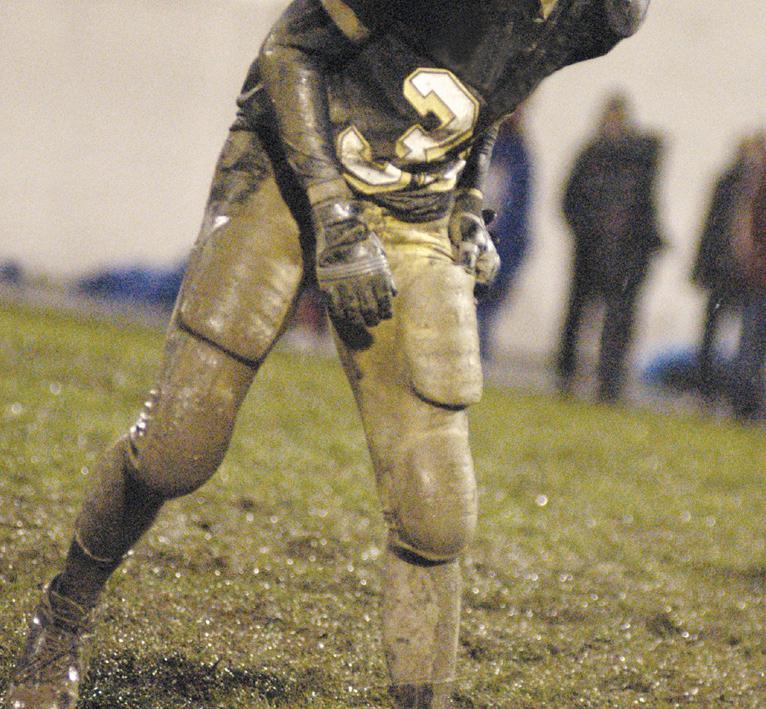
Aconversation about high school football took a theological turn at a recent office staff luncheon. One indication that you’ve done your job as a high school football player, it was pointed out, is a dirty uniform at the end of the game. No dedicated football player wants to leave the game with pants and a jersey as spotless as when he put them on. It’s too bad Christians don’t have the same mindset, someone said. We avoid getting involved with messy situations.
Clean or dirty? Most of the time, clean is the winner. But living as a disciple of Jesus means running a reverse play when it comes to clean versus dirty. Following Jesus means that we are as concerned about our neighbors’ troubles as we are our own (Matt. 22:39). It means that when people look at us, they see a “uniform”—a life—that is stained with the burdens, sorrows, challenges and dysfunctions of others, that the muddle of other people has splattered our no-longer-tidy lives.
So what’s the best way to get dirty? How does one foster relationships that provide natural opportunities for showing genuine love and care for others? Paging through this issue of the Christian Leader may give you some ideas.
Following Jesus means that we are as concerned about our neighbors’ troubles as we are our own.
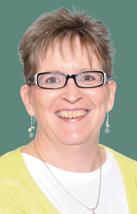
Connie Faber Editor
• Wally Kroeker invites us to view our jobs as opportunities for ministry—not just a paycheck (p. 16). Each of the 190plus USMB congregations penetrates an assortment of cultures each day, thanks to the jobs of our churchgoers. Work is a natural place to connect with people and to forge friendships that extend beyond the Monday through Friday workweek.
• The USMB Board of Faith and Life is calling us to be people that actively pursue peace and reconciliation (p. 17). Broken relationships litter our spheres of influence. God calls us to walk with one another through the complicated and messy process of re-establishing relationships following a failed marriage, restoring damaged family bonds and rebuilding workrelated connections.
• The story of efforts by members of Watershed, a church plant in Kansas City, Mo., to re-open a public school in their neighborhood (p. 21) reminds us that some of us are called to work within our communities. Our cities need Christians serving on city councils volunteering in nursing homes and initiating sports clubs.
• Becoming involved with an individual or family that is suffering can also taint our lives as we take on their burden of pain or sadness, as the story of two women at North Fresno, (Calif.) MB Church that established a ministry aimed at people dealing with life-changing illness illustrates (p. 19).
These articles remind us that there are lots of ways for followers of Jesus to “get dirty” as we rub shoulders with fellow believers and individuals who don’t yet know Christ. May our lives reflect a commitment to answering God’s summons to get off the bench and into the game.








Klassen

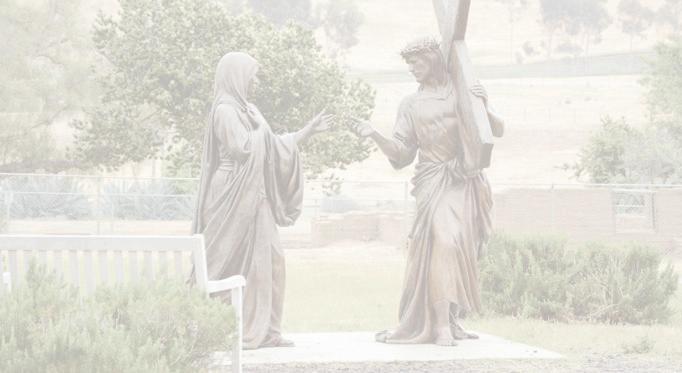







Brad Klassen

Redundancy: [ri-duhn-duhn-see] noun; repetition of information or inclusion of additional information to reduce errors in communication. More directly, repeat it till they get it!
Often God uses redundancy when he is showing me something he really wants me to get. For example, in our Life Group we’ve been studying the book of Galatians. The sentence, “The son of a slave wife was born in a human attempt to bring about the fulfillment of God’s promise,” in chapter four caught my attention. Not because of the implications of the children of the slave wife or freeborn wife. I wondered: “Do I too attempt to fulfill God’s promises for him?” But there was no time to think about it further, and I forgot about it. But God hadn’t.
The next morning, I read Psalm 127:1-2 and was reminded about human attempts to bring about the fulfillment of God’s promises. Essentially, Solomon is talking about our lacking confidence that God will come through with his promise to care for his children. Building or protecting what God says he will build and protect. I was reminded of the Galatians passage from the night before—how Abraham and Sarah had been concerned that God had forgotten or maybe changed his mind. In fact, they were concerned enough to help God out and take matters into their own hands with a servant wife.
Just as I take matters into my own hands. Because I am anxious that when God says “Don’t be afraid, I’ll take care of you,” he may not come through in time. Anxious that God’s strength may not be enough, after all.
God doesn’t say don’t build or don’t guard the city or don’t work to provide for your family. He doesn’t have specific requirements for how early we get up for work or how late we work at night. But he does give this principle: Don’t get up early and go to bed late, working all day, accumulating and guarding your “treasure” because you lack confidence that I might not live up to my promises. The point God was redundantly making for me with his multiple approaches to this lesson was to open my hands and give God room to do what he says he will do.
Aren’t you glad that God is willing to graciously repeat information or include additional information to reduce errors in communication—especially when the information is so critical to living lives fully confident in him?
Brad Klassen is lead pastor at Copperhills Community Church, a USMB congregation in Glendale, Ariz.

“Unless the Lord builds a house, the work of the builders is wasted. Unless the Lord protects a city, guarding it with sentries will do no good. It is useless for you to work so hard from early morning to late at night, anxiously working for food to eat; for God gives rest to his loved ones.” Psalm 127:1-2 (NLT)
CHRISTIAN LEADER
August / September 2013 Volume 76 • Number 4
Connie Faber EDITOR
Myra Holmes ASSISTANT EDITOR
Shelley Plett GRAPHIC DESIGNER
Mullins Studio COVER PHOTO
The Christian Leader (ISSN 0009-5149) is a gathering place for the people, passions and mission of U.S Mennonite Brethren. The Christian Leader is published bimonthly by the U.S. Conference of Mennonite Brethren Churches. However, the opinions expressed here are not necessarily those of the church as a whole.
COPYRIGHT The articles printed in the Christian Leader are owned by the CL or by the author and may not be reprinted without permission. Unless noted, Scripture quotations are from the New International Version.
READER PARTICIPATION Letters to the editor should be 300 words or less and on one subject. Letters must be signed and include the writer’s city and state. Letters will be edited for clarity, appropriateness and length. Letters will be published, as space allows, unless marked, “Not for publication.” Readers interested in contributing essays for In My Humble Opinion and First Person should contact the editor. Freelance article submissions are welcome; a SASE must accompany articles.
SUBSCRIPTIONS $10 for six issues and $20 for 12 issues ($15, $30 in Canada; all other countries $25 for six issues); $1.50 per copy
CORRESPONDENCE: All correspondence, including subscription questions and address updates, should be addressed to Christian Leader Box 155, 107 N. Main, Hillsboro, KS 67063-0155 Phone: 620.947.5543
E-mail: christianleader@usmb.org

MEMBERSHIP The Christian Leader is a member of the Evangelical Press Association and Meetinghouse, an association of Mennonite and Brethren in Christ editors.
POSTMASTER Send address changes to Christian Leader, Box 155, Hillsboro, KS 67063. Periodicals postage paid at Hillsboro, Kansas.
The Christian Leader is published by

U.S. Conference of MB Churches
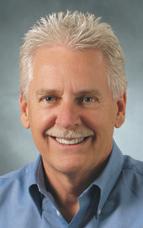
Ed Boschman USMB executive director ebed@usmb.org
Is religion losing its influence?
While they may use different words, friends and casual acquaintances increasingly voice the same question: What is wrong with our country? The question comes up most often when the discussion is about the general “health” of our nation in terms of sociology, politics, economics, crime and education. It is usually accompanied by an aura of serious concern and sometimes despair or even fear.
People often cite our educational and political systems as the core problems. Sometimes the failures and breakdown of the family make the discussion. While all of these can be logically supported as contributing factors, my mind most often goes in other directions—to the drift from God, the Bible and theology at the center of thinking and learning to the political incorrectness of bringing God into consideration. To the severe decline of clearly defined rights and wrongs and living and teaching what is right. And most importantly, to the state of the individual moral health of people in our country.
Our country’s history is interesting in this regard. “Let us with caution indulge the supposition that morality can be maintained without religion,” said George Washington, our first president. “Reason and experience both forbid us to expect that national morality can prevail in exclusion of religious principle.”
John Quincy Adams, our sixth president and considered by some to be the eminent diplomat, said, “The highest glory of the American Revolution was this: It connected in one indissoluble bond the principles of civil government with the principles of Christianity.”
Gallup pollsters have been following this subject for quite some time. Recently they asked the question again: At the present time, do you think reli-
gion as a whole is increasing its influence on American life or losing its influence? Gallup reports a record high 77 percent of us believe that the United States is in a dangerous moral decline. However, Gallup polls also indicate that 75 percent believe that the church is needed to reverse the trend.
This takes us back to the original question: What is wrong with our country? Might it be that our general population has unhooked from the moral foundations that give religion its influence and traded moral absolutes for relativity? That 91 percent of our people do not name God as the most important reality in their lives? Might it be that Christian believers and churches have gone off mission by trading following Jesus for religion?
What troubles our nation is in part systemic in our structures and institutions. No country’s organization is without flaws. But our real problems are matters of the heart. The state of moral health in our country will not improve unless hearts change. And only God can change a heart.
The church is the people of God. While it is true that Jesus’ church has a global mandate, we are to be on mission in our towns, cities, counties, states and nation. The last time the God factor got a boost was after 9-11. Only God knows when he will declare the end of the church age, and until God does, every season is another occasion for us to rise to the opportunity for spiritual influence. Will we be on mission? Will we choose intentional influence for God? Will we invite people into a heart-changing, faith-follow relationship with Jesus?
This will happen only if we individually and corporately faithfully follow our Lord, obediently prioritize his disciple-making mandate and do whatever it takes and pay whatever the cost to make it happen. Let’s build that legacy!
The state of moral health in our country will not improve unless hearts change. And only God can change a heart.
Shelley Plett

Buoyancy, freeboard and monsters
My four-year-old nephew took me on a boat ride. He named himself the captain, pointed out the bow and the stern and bravely paddled away from the pond monsters and crocodiles.
In addition to what he taught me, the extent of my nautical knowledge is that there are requirements to keep a ship above water. One is buoyancy—the boat must weigh less than the volume it would take to fill the “hole” the boat makes in the water. Another is freeboard—the distance the main deck rises above the waterline. This helps it withstand turbulence. The more freeboard, the more reserve buoyancy available if the ship gets tossed around in rough waters.
Like matters of spirit (and sanity), a boat’s (and person’s) ability to float depends on balance and distribution. A boat leaves the dock with one fisherman, tackle and a pole. Buoyancy is high. Freeboard is ideal. But after a few hours on the water, the fisherman may pick up some baggage: a friend with a tackle box of his own and on a good fishing day, a decent catch to take back to shore. By the time it heads for land, the boat may move a little slower from the added weight, dipping lower and lower into the water. Unless its load is lightened, it could be pulled under by its own weight.
Life imitates more than art. Boating too, as it turns out. A few years ago I was in the midst of a crumbling marriage. That in and of itself is a faith-shaker. Anyone who has gone through divorce will relate to the emotions that cycle. Pain leads to anger. Anger to paranoia. Paranoia to fear. Fear to doubt. Doubt to despair. These are difficult emotions individually. Thrown into a blender, they become nearly unbearable.
Enter balance and distribution. I met two people during this time that held me above water. But they did it in very different ways.
One was a pastor my husband and I saw for counseling, both individually and together. I didn’t know if my
marriage could be saved. But after a few months of counseling, this pastor showed me the other side of my problem—the extra weight and baggage I was carrying. My worry and doubt were heavy and slowly pulling me under. He showed me how simple (although not easy) it could be to begin dropping those dead weights. Or in this case, lifting them up. It was time to stop scooping out cups of water and look at the source— the gaping hole.
The other person entered under the guise of concern. Another spiritual leader who had caught wind of my troubles offered his help, which I accepted in hopes of making sense of the mess. Unfortunately, our first and last meeting began with an insult to the very counselor that had brought faith back into my life and ended with a comparison of my family’s limited involvement in church with others who were more involved. At that point in time, the last thing I needed was another unmet expectation.
Yet in a divine way, these two contrasting interactions worked. I had to fight to get through my anger, but I got a big lesson in human limitation. No person could fix this. Instead of praying for an overnight miracle, I began to pray for the right words when I talked to my children about our situation. Instead of lying awake at night wondering how I would fix it all, I asked for “the wisdom to know the difference.”
Slowly, I became more buoyant. I began to float, aimlessly at times, but it was better than sinking. And from there, I realized that whether or not my marriage survived, I would. God sent people to captain me through the rough waters and to keep the pond monsters and crocodiles at bay. This was my reserve buoyancy.
Shelley Plett is the graphic designer for the Christian Leader. She works in design and as a columnist for the Hillsboro Free Press, Hillsboro, Kan.


ICOMB gathers in Peru

All 20 global Mennonite Brethren conferences were represented at the 2013 International Community of Mennonite Brethren (ICOMB) summit May 21-27 near Trujillo, Peru. Ed Boschman, USMB executive director, represented U.S. Mennonite Brethren. Boschman asked ICOMB delegates to reflect on changes to the USMB Confession of Faith. ICOMB discussed and affirmed a draft of proposed changes to Article 13, Love and Nonresistance. “Given that the written statements of our beliefs have been taught around the world by our missionaries and adopted by many of our sister country conferences, and that we have beyond that an unwritten commitment to ‘believe and confess’ together, we believe it is honorable and right to engage our global brothers and sisters in our review and discussion process,” says Boschman.
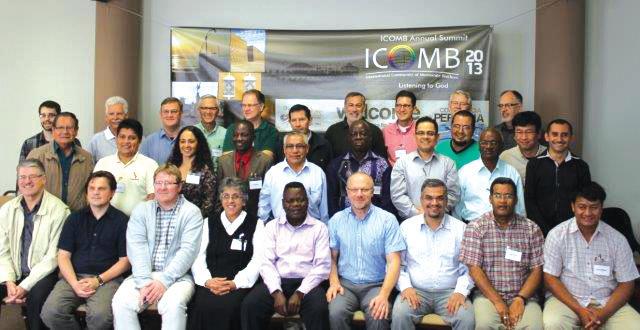


In other business, ICOMB delegates discussed a proposal to establish “Global Elders” to effectively exercise authority and to resource one another in areas of need. A decision regarding global elders is slated for 2014. Also on the agenda was the Global Scholarship Fund; ICOMB distributed $40,000 to train leaders from the global South or from emerging and small conferences of the global North who will train other leaders. The summit included time for Bible study, sharing, prayer, communion and footwashing. The 2014 ICOMB summit will be held in Angola.—ICOMB/Connie Faber
Slavic Ministries staff position discontinued
A two-year joint venture initiated by USMB to hire a national Slavic Ministries director has ended. In early May, USMB executive director Ed Boschman announced the decision to discontinue the position. In addition to the USMB national conference, the Pacific and Central District Conferences as well as MB Foundation and MB Mission were partners in this most recent effort to better connect the 34 USMB Slavic congregations to district and national ministries.
The decision to discontinue the position was prompted by the resignation of current Slavic Ministries director Aleks Borisov, Spokane, Wash., who is now serving as the church plant pastor of an English-language congregation being planted by Pilgrim Slavic Church, a USMB Slavic-speaking congregation in Spokane. —CL

Epp concludes USMB ministry
J Edward Epp has concluded his work as the USMB director of development, effective June 30. USMB Executive Director Ed Boschman made the announcement July 3. Epp, who served for nine months, was responsible for coordinating public relations, designing and implementing fund development programs and strengthening connections with churches and partner agencies. Epp was the first individual to hold the position on a full-time basis since the position was created in 2011. “We affirm J for his shepherd’s heart and for his love for the church,” says Boschman in the announcement. “We are grateful for his positive commitment to and service in our USMB family. We pray God’s best for J and commend him to our churches for future ministry.”—USMB news service
ICOMB
Historical Commission meets
The Mennonite Brethren Historical Commission (MBHC), a joint commission of USMB and the Canadian Conference of Mennonite Brethren Churches, held its annual general meeting June 7-8 in Winnipeg, Man. The Commission heard reports from its archival centers in Hillsboro, Kan.; Fresno, Calif.; Abbotsford, BC and Winnipeg. Man. MBHC also followedup on two competitive awards initiated in 2012 thanks to the Katie Funk Wiebe Fund: a summer internship and a research grant. Amanda Bartel, a student at Bluffton (Ohio) University who was selected as the 2013 intern, finished her five-week rotation of the archival centers in Winnipeg and reported in person on her experience. The Commission selected a proposal co-authored by Canadians Christine Kampen and Dorothy Peters as the recipient of the $1,500 research grant. Their research will focus on their own personal Christian spiritual formation and the “legacy of leadership” they received from their grandparents and parents.—MBHC


5 minutes with...
DR. LARRY BUSCHMAN
Back in 1973 Dr. Larry Buschman was among the first scientists to successfully rear fireflies in a laboratory. Now in his retirement, he has made another breakthrough: decoding the insects’ communication system. Buschman, who attends Garden Park MB Church in Denver, Colo., took a break from chasing down firefly sightings in western Colorado to tell his story to Fast Chat.
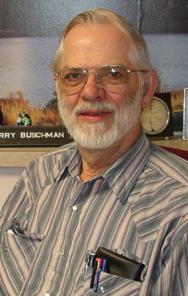

How did you first become interested in fireflies?
For our senior projects at Tabor College a girl in my class did a project on bioluminescence that I thought was interesting. That girl was Rose, who became my wife.
After working in farm pest management with Kansas State University for 30 years, why have you come back to the firefly?
There was a drawer full of research from over the years that needed to be finished and published. Plus, I heard about a study of fireflies in Tennessee and just felt like this was something I needed to check into—like a bucket list.
How did you go about your recent research?
Last winter I put mattresses up against the windows in my spare bedroom and reared some Tennessee fireflies. Just sitting there watching them was like listening to people speak a foreign language. I started putting it on video, and when I went through it frame by frame I could see what pattern they were using.
What was the next step?
I had a flasher built to exactly mimic a female firefly and flew back to Tennessee to see if the natives would understand. It worked like a charm! I had reared these insects for ten months and was able to speak their language myself— something brand new for science.

Where do science and faith intersect for you?
Science, the study of the physical universe, is as much a part of my faith as studying Scripture, the other revelation from God. I have always had a sense of reverence working with science.

Interview by Kathy Heinrichs Wiest
Youth Committee sets date
The National Youth Committee has announced the dates and location for the next National Youth Convention: NYC 2015 will be held April 9-12, 2015, at the Hyatt Regency Downtown/Colorado Convention Center in Denver, Colo. The theme for the event will be “Named,” taken from Matthew 16:13-19. The National Youth Convention is a gathering of high school youth from USMB congregations across the nation that occurs every four years. For more information, visit www.named2015.com —NYC

TC, FPU FACULTY RETIRE
Two long-standing faculty members have retired from Tabor College, the Mennonite Brethren college in Hillsboro, Kan., and four faculty members have retired from Fresno Pacific University, the MB university headquartered in Fresno, Calif. Among the FPU retirees is Paul Toews, who served for 44 years as a history professor and led 15 Mennonite Heritage tours to Ukraine. Richard Kyle, Tabor College professor of history and religion for 41 years, retired from the classroom at the end of the 2012-13 academic year but will lead his 27th January Interterm trip to Europe in 2014. Judy Harder, a Tabor College faculty member since 1987 teaching in the communications department, has also retired, although this fall she will direct Godspell, her 26th Homecoming production.

Colombian MBs request prayer





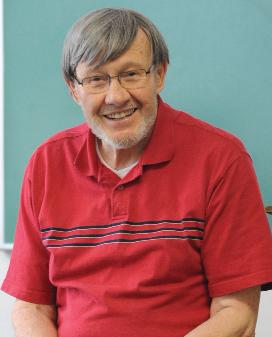


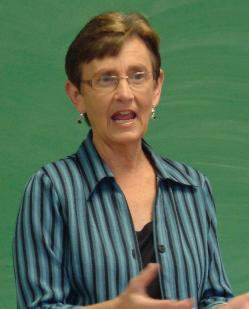


Seminary students attend Hispanic Summer Program

The International Community of Mennonite Brethren and Mennonite World Conference requested prayer this spring for Colombia’s Mennonite Brethren Church of Chocó on the west coast of the country, where Mennonite Brethren families and communities lost their crops and water sources due to aerial fumigation carried out May 10 by the Colombian government. “Our fellow members are suffering due to the destruction of their crops,” says ICOMB general director David Wiebe. “It is close to harvest time. Please remember our friends in your prayers.”–ICOMB/MWC

Six students from Fresno Pacific Biblical Seminary, the MB seminary in Fresno Calif., participated in the Hispanic Summer Program June 22-July 5, 2013, at the Oblate School of Theology in San Antonio, Texas. The Hispanic Summer Program is a nonprofit educational service operated by a group of more than 50 seminaries, universities and theology departments. FPBS participants were: Elizabeth Cortez, Monica Heredia, Cindy Hernandez, Hector Hernandez, Cindy Mendez and Ivan Paz.—FPBS



Judy Harder
Richard Kyle
Paul Toews





Have you heard the one about the Rabbi and a man infested by a legion of demons that are on the beach near the Decapolis? The Rabbi orders the legion out of the man and into a couple thousand grazing pigs. The pigs march into the sea and drown. The townspeople tell the Rabbi to get lost, and he tells the disinfected man to go tell all that the Lord has done for him. So the man goes and tells all about the Rabbi!
Pigs, legions and lords—it’s an inside joke. Get it? No?
I don’t blame you. Comedy, like Greek, is hard to translate, especially comedy from a different culture, worldview and political context. Age it over two millennia and you end up with a story that seems more scary than funny. The setup becomes the emphasis and the punch line is brushed aside and forgotten. That’s the problem with a 2,000-year-old joke—timing.
Mocking
the Roman Empire in Mark 5
Missed the punch line?
In Mark 5:1-20, Jesus casts demons into a herd of swine, emancipating the overrun man from the demons. We habitually view this as the culmination of the story. But what if we’ve celebrated prematurely? What if we have misidentified the victorious moment, thereby missing the punch line and misunderstanding the climax of this story of mockery for a weird moment of collateral damage and property destruction?
Maybe we have totally missed the joke, and it’s about the pigs. The deviled ham, the soggy hoggy—that’s the joke, and for Mark’s audience it was therapeutic comedy gold. Two thousand pigs near the Decapolis in 1st century Palestine. Now that’s funny. Not because this herd of swine is located in ancient Palestine; Mark clearly explains that this story happens in Gentile territory. What’s comical is the size of the herd. Two thousand pigs is a massive swine operation, even by today’s standards. That’s a lot of bacon!
In ancient farming practices, pigs would typically be kept in a sty housing at most a few dozen. Just watering a dozen pigs would take much needed water away from a thirsty village, especially in the arid desert climate, much more all the grain they’d require. Pig farming was not a sustainable enterprise in 1st century Palestine and a herd of 2,000 swine would be a near ecological disaster to the region.
Who has the resources to take care of 2,000 pigs and what could you possibly do with them? It’d take the resources of an army to care for them. It’d take an army to consume them all, and in Jesus’ and Mark’s day there just so happened to be

by TRENT VOTH
an army nearby. The Decapolis was the headquarters to an entire legion of Roman soldiers.
This legion staying in the Decapolis is no random military unit. It’s none other than Rome’s well-known Tenth Legion—Legio X. Mark’s original audience would know Legio X well; you’ve probably heard of their atrocities too. They’re infamous.
The infamous Tenth Legion
It’s the Tenth Legion that destroyed the Monastery of Qumran, where in a last ditch effort to preserve their work, monks hid some of their scrolls in caves near the Dead Sea. It is the Tenth Legion that helped burn Jerusalem to the ground and destroy the temple in the First Jewish-Roman War (6673). It was Legio X that laid siege to Massada in 71 effectively ending the war, and it was the Tenth Legion that was stationed in Jerusalem after the war, the only legion left in the region to maintain the Pax Romana, the Peace of Rome. This is the army encamped in the Decapolis during the event in Mark 5.
Historian R.W. Davis notes that Roman soldiers throughout the Empire got a daily ration of one pound of meat a day of mostly, you guessed it, bacon. This herd was always destined to be slaughtered by a legion, either one of demons or one of soldiers. Now the Tenth Legion’s food supply has been affected by Jesus’ ministry to release the oppressed. The Legion camping in the Decapolis feels the reverberations of Jesus’ ministry in the region; they lose ground and possessions to this invading king named Jesus.
But that’s not all. The Tenth Legion, just like modern military units and sports teams, had a mascot. This mascot was imprinted upon their banners that they carried during campaigns, on the silver they traded throughout their camp and on the statues and arches built in their legion’s honor. The mascot of the mighty Tenth Legion, destroyer of temples and monasteries, was none other than the pig. No kidding.
Beginning to understand the joke? This is a story of Jesus mocking both Satan and the Roman Imperial forces. And the parallels go even deeper. The Greek word agele, “a herd,” can also refer to a group of military trainees, and hormao, Greek for “rush,” is also used to describe a marching army. In his article, “Spirit Possessions and the Garasene Demoniac,” Duncan Derrett notes that “pigs are an independent bunch. They tend to scatter when frightened rather than stampede. This is no longer a herd of pigs but an army marching together.”
Even the march into the sea carries its own political parallels and humor. Not only was the sea a mysterious, chaotic locality of demonic powers, it was also the place where God destroys empires. What God-follower would hear of the destruction of an imperial military regiment in the sea and not think of Egypt’s defeat and God’s victory at the Red Sea in Exodus 14:26-30? Here again, the sea is the instrument used by God to conquer and subdue an empire.
Total victory
As theologian Joshua Garroway points out, “The victory of Jesus is total. He humiliates the world’s strongest fighting
force with absolute ease. With but a single command he turns the violent urges of the opponent against itself, causing it to self-destruct…. (Just as) God drowns a mighty army in the sea; here the Son of God does the same.”
Garroway centers on an essential element that Mark is preaching in this passage. The violence and force of the enemy are used against it. The empire is conquered through its own infliction of force—it self-destructs.
Garroway goes on, “Where Legion is irresistibly powerful, Jesus is more so. Where Legion is destructive, Jesus has the power to turn its destructiveness against it.” This is Jesus’ strategy. He embodies it on the cross. It’s his instruction to his followers in Mark 8:34: “Whoever wants to be my disciple must deny themselves and take up their cross and follow me.” It will be through peacefully and faithfully accepting and enduring the empire’s destructiveness that victory is attained. That’s the mockery, the violence empires depend upon are used against them.
The swine herders gather the community. Their reaction of fear is somewhat confusing to modern readers, but to Mark’s audience their fear is understandable, especially given the symbolism of the previous events. A legion has been cast out; the symbol of imperial dominance has been shaken. Their world is thrust into disharmony as a result of Jesus’ arrival and power, and so they ask Jesus to leave.
Mark’s audience would have encountered similar reactions. The Christians in Rome would have been seen as a discordant group, proclaiming a different “Lord and King” and a competing kingdom. No patriotic Roman would want such subversive, dissident Christians as neighbors or associates. Their community would see them as a potential danger, a cancer that needed to be removed. That removal—the persecution of Christians by Emperor Nero—is likely happening to Mark’s audience as they read this story. They need some humor. They need hope.
Jesus has the ability to defeat legions and free the oppressed. True peace has arrived. Even more so, the tables have turned. The invaded becomes the invader, sent back to the Decapolis proclaiming the invasion of a new Lord and King, Jesus. That’s part of the joke too. Jesus instructs the once demon-possessed man to “go and tell all that the Lord has done for you.” Does he go and tell of all that Lord Caesar, commander of legions, has done? No, it’s Lord Jesus that truly has power here.
All competing empires and governments are a joke and don’t stand a chance. It’s the same joke Paul continues in Colossians 2:15: “(Jesus) disarmed the rulers and authorities and made a public spectacle of them, triumphing over them by the cross.” Do you get it? It’s an inside joke, but if you listen closely you can almost hear two millennia of Jesus-followers laughing.
Trent Voth is the assistant pastor of youth and worship at College Community Church MB in Clovis, Calif. He is a graduate of Tabor College, Hillsboro, Kan.; Mennonite Brethren Biblical Seminary and Fresno Pacific University, both in Fresno, Calif.
GOD’S




Why the people I disagree with sharpen my understanding of God and his purposes
The other day I had a routine eye exam. Resting my chin and forehead on the foam pads, I looked at an eye chart through the optometrist’s phoropter. The doctor selected a couple of lenses and asked: “Does it look clearer with this lens or— (click)—this one?”
We Mennonite Brethren often find it unsettling to listen to viewpoints different than our own—to look through an unfamiliar set of lenses. Hearing a person diverge from what we consider an orthodox way of thinking about faith or Scripture puts us on the defensive, ready to fight for what we know to be right. But is vigorously defending my way of thinking the best approach? Could my unwillingness to listen to someone else mean that I miss the opportunity to see God in a new and wonderful way?
Speaker, author and former Mennonite pastor Shane Hipps is one of the voices that some Mennonite Brethren consider outside the orthodox. Speaking at Fresno Pacific University’s Ministry Forum last spring, Hipps said that each person looks at God’s Word through his or her own unique set of lenses. The lenses are made up of life experiences and exposures, bringing certain aspects of God’s Word into clearer focus and opening up new understandings.
Hipps shared the story of a change in his own lens. Before he became a father, Hipps pictured God as a night watchman as he read a psalm that said that God doesn’t sleep. It was a negative picture of a watchful God. “(God) was looking out for a criminal—and maybe that criminal was me!” said Hipps.

“But then I had children,” said Hipps. “The first two months of my daughter’s life were spent with me being vertical. Rocking my daughter and thinking about the suffering we parents would go through for our children, I heard that passage through a completely different lens—the lens of a parent who was suffering for a child.”
Hipps’s experience of parenting was like a lens in a phoropter—in this case a lens that brought God’s character into new focus for him.
What would happen if we would think of people speaking from different points of view as lenses in God’s phoropter? As my spiritual optometrist, God’s goal is to bring everything into clearer focus. Instead of a threat to my belief system, each encounter or new idea becomes a lens God is inviting me to look through in an effort to improve my vision.
During my eye exam, not every lens in the phoropter made things clearer. In fact, some made it impossible to see the letters on the chart. In the same way, not every voice or experience we explore will give clear focus to our understanding of Scripture. But, just as all the lenses the optometrist uses are essential along the path to clear vision, each exposure is another opportunity for God to shape our lenses and bring himself and his purpose into clearer focus in our lives.
So how do we go about trying new lenses that can lead to greater understanding?
Recognize our lenses
Recognizing our own lenses is an essential first step
by KATHY HEINRICHS WIEST

in growing in our understanding of God and his Word. At the ministry forum, Hipps outlined several of his own lenses on Scripture and invited forum participants to challenge those lenses and share their own.
“We can have a debate about any of these,” he said, “because we are just talking about lenses and not about the Bible itself. What we’re not talking about is changing the Bible; we’re talking about changing how we see the Bible.”
Tim Neufeld, an FPU faculty member who helped host the ministry forum, agrees that self-awareness is key to growing in our understanding of Scripture and to having meaningful dialogue about it. “I can speak for the lenses I wear if I recognize what they are, but when people don’t understand they’re wearing lenses we can’t have a conversation,” says Neufeld.
Knowing we have lenses and understanding what those lenses are gives us freedom to discuss and debate with humility and grace for others’ points of view.
Be active listeners
Once we have taken the first step of acknowledging our own lenses, we are ready to engage with others. While that engagement may involve arguments in support of our own lenses, it must also be characterized by a willingness to listen to others.
In exploring the topic of lenses I checked in with Tabor College President Jules Glanzer. He recommends a method they use at Tabor called “apprecia-
A weekend with God’s phoropter
While recently vacationing in San Diego, Calif., my husband and I had three very different church experiences all in the same weekend. Each one offered a unique lens on worship.
Saturday night we attended a “Live” service (with a live preacher instead of a video feed) at a 10,000-member megachurch that meets weekly in 27 venues on four campuses. I had some questions about what it means for this church to pattern their church campus along the lines of a contemporary shopping mall, but I was inspired by the biblical preaching and the church’s commitment to serving their community in the big way that only a mega church can.
Sunday morning we joined the seven members of a small Mennonite church temporarily meeting in the chapel of a retirement facility. Together with the elderly people from the facility, the congregation that morning numbered almost 20. I wondered about the sustainability of such a tiny body of believers. At the same time, it was touching to watch a young member of the congregation tenderly greet and minister to the elderly people who had joined them.
We spent the rest of that Sunday morning touring a nearby Spanish mission where a life-sized bronze sculpture of Jesus meeting Mary on the way to Calvary captured my imagination. Even though I don’t identify with the Catholic practice of using icons in worship, the beauty and expressiveness of the work caused me to pause and reflect on Christ’s humanity and suffering.
All of these church experiences diverged from my typical Mennonite Brethren worship experience. Each raised questions in my mind. But each one also offered a new lens that expanded my appreciation for the gift of worship.—KHW
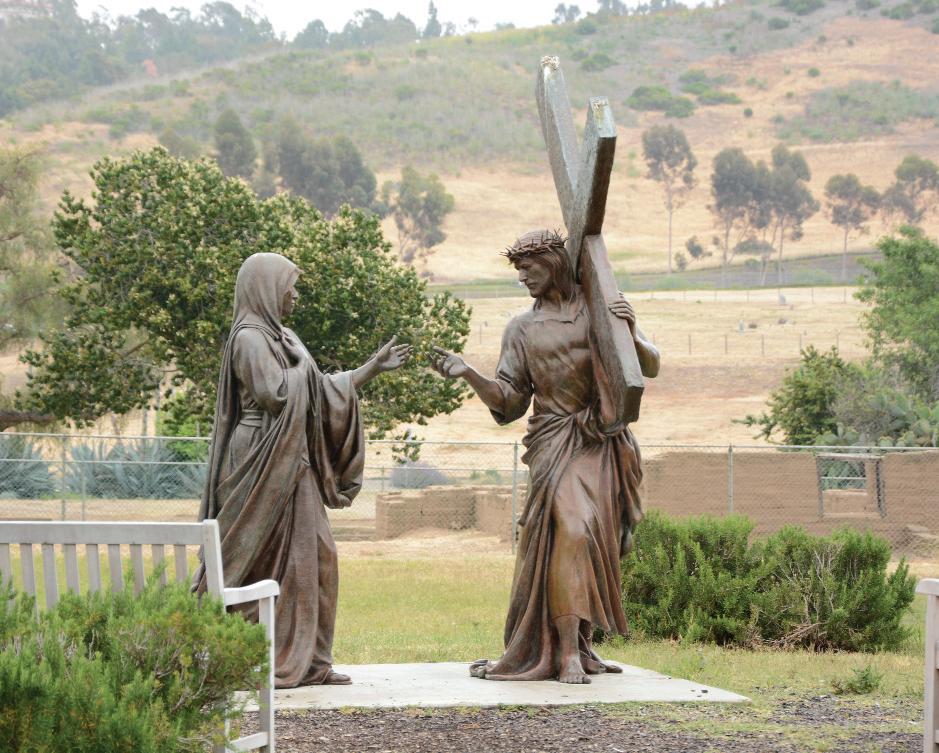
Just as all the lenses the optometrist uses are essential along the path to clear vision, each exposure is another opportunity for God to shape our lenses and bring himself and his purpose into clearer focus in our lives.
tive inquiry” which involves recognizing “that everybody’s perspective and experience is different than yours.” In this approach a person makes every effort to understand the other point of view.
Glanzer explains appreciative inquiry this way: “Try to listen to the voices, hear it from their perspective. What is motivating them? What are they trying to say?”
To listen and understand another viewpoint does not mean agreement. But an attitude of attentiveness and trying to understand helps take us beyond our own limited lenses and can open up new vistas of understanding.
Don’t let differences blind you
There’s an old joke that wherever you have three church people you have four different opinions. Often differences in opinion become walls that divide us. Within our own church family we tend to major on the differences and put great energy into correcting the errors, however minor they may be.
Pastor Steve Harms of Neighborhood Church (Visalia, Calif.) had an interesting take on this issue. After talking with him for another writing assignment, I told Harms I was writing an article about the value of listening to a variety of voices. He jumped right in and talked about it from a pastor’s point of view.
As someone who preaches every Sunday, Harms often encounters people who find a flaw in a sermon and just quit listening. He would much prefer that people would hear him out and even come back to him and ask, “This is what I heard you say. Is that what you wanted to say?”
“It’s a mistake for me to write you off because you say something I don’t agree with,” he says. “The fact is, ‘We know in part and prophesy in part.’ We need to learn to listen and take the nuggets that are true.” Harms advocated listening “through a lens of grace.”
Seek out other voices
Hipps is a great promoter of trying out many lenses. “The more lenses you can be exposed to, the more you have a chance to learn the truth,” he said. “The more exposure we have, the clearer and fuller picture of truth we have.”
One author I particularly enjoy is Lauren Winner. In her memoir, Girl Meets God, she talks about her con-
version as an adolescent to Orthodox Judaism. She fell in love with the rituals and intense study of Scripture that characterize the Jewish faith. Later, she had an encounter with Jesus in a dream that, during her university years in England, led her to become a Christian believer and join the Anglican Church.
Now I’m not likely to become an Anglican and even less likely to convert to Judaism, but reading about the significance this author found both in the rituals of Judaism and in the liturgy of her Anglican church has expanded my appreciation for the historical roots of the Christian faith, the rhythms of our own church celebrations and the meaning behind our traditions.
By reading an author who sees faith through a different lens than my own, I am seeing God and faith in a way I never would have by just reading the Mennonite Brethren point of view with which I am so familiar.
FPU’s Neufeld agrees: “A requirement for selfawareness is being exposed to something different than who you are.” He notes how in the book of Proverbs wisdom comes from listening to the counsel of others. Among those others should be people who are coming from a different point of view than our own.
“If I only listen to what I already know, I just reinforce what I already believe,” says Neufeld. “In my mind, that’s the definition of a fool in Proverbs.”
Neufeld sees his own students’ understanding expand as they look at Scripture through lenses of people very different than themselves: “I take students to Los Angles and we read the book of Amos right on skid row. Reading about selling the needy for the price of shoes makes sense in a whole new way when you’re in the context of the sweat shops that are open all night, and you think about where your own clothes come from. It changes the way we read the prophets.”
Glanzer adds that the young leaders in our own denomination have a voice worth seeking out. The Tabor College president advocates listening to how God is leading young leaders in new expressions of faith. “The worst thing we can do is to try to make young people think like old,” says Glanzer. Rather, we need to listen to them and see what their unique perspective has to offer in shaping our own lenses.
Whether it’s reading authors, engaging in dialogue, or studying Scripture in the shoes of people coming out of a different context, the payoff is profound for people willing to seek out different voices.
Explore other cultures
Anyone who has been on a cross-cultural mission trip can attest to the transforming power of being immersed in another culture. It’s almost cliché to say you don’t come back the same person as you were when you left.
Cory Seibel, a Fresno Pacific Biblical Seminary faculty member involved with the ministry forum, enjoys helping his seminary students try new lenses by taking them into cross-cultural contexts. He challenges them to make the most of these exposures by approaching the new relationships with humility: “Come as learners, understanding that the way you’ve read Scripture to this point is shaped by your life experience and relationships with people like you. You will realize that you haven’t even thought about the kind of question these people are asking.”
Seibel sees his students come away with new questions and insights but also a new awareness of their own lenses. “The goal is to come back seeing differently, both ourselves and others, and to come to Scripture with a fresh ability to ask questions and learn,” he says.
Proverbs 19:20 admonishes those who want to be wise: “Listen to advice and accept instruction, that you may gain wisdom for the future.”
Advisors and instructors can turn up in unexpected places. I’ve met them in our church youth group and in the form of a beggar in a parking lot. They have lived in remote villages in Paraguay and the hollers of Kentucky. I’ve heard their voices in books by Catholic monks and from the podium of an atheist philosophy professor.
As I allowed God to be my optometrist, each of these people became a lens in his phoropter. He dropped each one— (click)—into place and invited me to take a look. Under his guidance their unique lenses helped shape my own view. With my chin resting on God’s phoropter I can enjoy trying out new lenses and trust him to guide me toward a clearer view. It’s a delight to find myself gazing into his face and his Word with a refreshing new perspective.
Kathy Heinrichs Wiest is a freelance writer with a long history in the Mennonite Brethren church, including involvement in four different MB congregations and all three US Mennonite Brethren educational institutions. Currently she and her husband, Steve, are active members at Kingsburg (Calif.) MB. One of her greatest joys is learning from the unique lenses of people who are new to faith and to the Mennonite Brethren.
Hipps reflects on Mennonite “lenses”
Shane Hipps spoke February 21 at Fresno Pacific University’s Ministry Forum. Currently a ministry consultant and executive coach, Hipps was called into ministry from the world of high-powered advertising where he created marketing campaigns for Porsche. His first pastorate after graduating from Fuller Seminary was at Trinity Mennonite Church in Phoenix, Ariz. He was also the teaching pastor at Mars Hill, a nondenominational megachurch located in Grandville, Mich.
His initial interest in Mennonites and Anabaptism was piqued while on a visit to the home of his mother-in-law, an avid collector of what he calls “Amish kitsch.” He was intrigued by a couple of “garage sale books” among her collection. When he returned to Pasadena he found Mennonites in the Yellow Pages and eventually became part of Pasadena Mennonite Church.
During a break in the Ministry Forum, Hipps took time to talk about Mennonites and their lenses. –KHW
KHW: In what unique ways do Mennonites view faith? Hipps: A major lens of Mennonites is community. I chose the Mennonites because I like the kinds of Christians those lenses produced. They were more humble— more capable of handling disagreement. The way of following Jesus is rooted in your behavior and not your belief.
KHW: What lenses do Mennonites bring in looking at Scripture?
Hipps: Mennonites read the Bible through Jesus, and they specifically look through Matthew’s Jesus and the lens of the Sermon on the Mount.
KHW: You’ve written a lot about media and the church. How do Mennonites relate to media?
Hipps: Mennonites and Anabaptists are the first ones to actually have a theology of technology in a really meaningful way. They are the first to ask the question: What is the impact of this technology on the community? If it’s not going to further what we’re here for, let’s not adopt it.
KHW: These kinds of questions take time to process while technology is changing so rapidly.
Hipps: The lens Mennonites bring to decision-making is “power is bad.” Suspicion of centralized power is good theology, but it gets perverted when everything is done by consensus. It becomes difficult to make decisions at a pace consistent with culture change. Mennonites need to learn to empower leaders—to keep power and responsibility together.
KHW: Are there benefits to processing these kinds of questions together?
Hipps: I think robust consensus decision-making structures are very healthy and make for an empowered community. The key is you have to give authority to someone who gets to decide which issues we’re going to decide by consensus and which we’re not. The content of what Mennonites bring is so powerful—a concrete way of following Jesus. I’d like to see it have a more potent impact in the world.

by WALLY KROEKER



10 Ways to affirm weekday ministers
Churches expand God’s reach when they celebrate the Monday-to-Friday activities of their members. The church can breathe new life into daily work—even into whole careers—by helping members reclaim the work week for God. Here are some ideas to help make your church a workfriendly zone.
o 1. Map your city. Get a map of your community and mount it on a bulletin board. Use colored pushpins to show where members work and where retired members used to work. You’ll have a visual display of your congregation’s Monday-to-Friday outreach.
o 2. Invite your pastor to drop in for coffee break or brown-bag lunch at your plant or office. Encourage a few friends to do the same. Your pastor will gain valuable insights into the part of life where you spend a lot of your time.
o 3.Volunteer to organize a series of workplace testimonies where selected members explain, “How I connect Sunday and Monday.” Have them talk about their job, the day-to-day issues they face and how their faith helps them witness while they work.
o 4.Many churches commission people for mission work. Why not encourage your church to do the same for Theresa the Teacher or Arthur the Accountant.
o 5.Plan a Sunday school elective on the theme of work. Use resources like Faith Dilemmas for Marketplace Christians (Wipf & Stock), which is designed for a 13-week quarter. You’ll find that many people are energized to talk about their work in the context of the church.
o 6. If you have a church newsletter, suggest that it carry anecdotes featuring members’ jobs and the challenges they face Monday to Friday.
o 7.Work strikes a responsive chord in worship— and not just for Labor Day weekend. Here’s a suggestion for worship planners: Ask members to show up some Sunday wearing their usual work garb to illustrate the diverse cultures the congregation penetrates every week. Imagine the sight as electricians, nurses, mechanics, firefighters, medical technicians, janitors, waitstaff and office workers sport their uniforms.
o 8.Offer to arrange a “tools of the trade” worship display to showcase goods and services put forth by members during the week.
o 9.Suggest a special benediction to signal that the work week is an important part of the Christian life. Sample: “Sisters and brothers in Christ, we are NOT dismissed; we are NOT just free to go—Christ sends us. Go forth into the world in the power of the Spirit; go to help and heal in all that you do.”
o 10.Post a sign over the main exit door that says “Service Entrance.” But post it on the inside, not the outside. That way it’s the last thing worshipers see as they leave, reminding them that they are heading out into the world to spend the next week as ministers.
Wally Kroeker is the Mennonite Economic Development Associates director of publications and the editor of The Marketplace, a bimonthly magazine published by MEDA to encourage a Christian witness in business and to operate business-oriented programs of assistance to the poor.

Stirring hearts for cause of peace
BFL testing draft of Confession of Faith Article 13
As the USMB Board of Faith and Life is testing a draft of Article 13 of the Confession of Faith with constituents, this board that serves as the “guardian” of the Confession is hoping to do more than pass a revised statement on love, peacemaking and reconciliation.
“If our primary agenda was simply to get a revised statement passed, we could easily get that done,” says BFL chair Larry Nikkel in an email interview. “The reason for seeking broad-based input is to build broad-based support for the statement within the constituency. The kind of support that is not only for a revised statement but which resonates deeply within the hearts of our pastors and church leaders for the cause of peace, beginning in our hearts, congregations and communities and which then extends to national and international issues.”
In June, BFL released a revision of Article 13 for testing, giving constituents until Aug. 15 to provide feedback.
“This is a draft only,” says BFL in an open letter accompanying the revision. “That means we invite pastors, those who participated in the study conference, those who participated in the conversation subsequent to it and any other interested Mennonite Brethren to examine this draft and provide feedback on it.”
In addition to seeking feedback on the current test draft, BFL is conducting workshops at each of the district conventions this summer and fall to involve the entire constituency in discussions about changes to Article 13. And BFL will meet with congregations or groups of congregations for further discussion upon their request.
“The goal is to keep improving the draft until we are ready to recommend ratification at the national convention (Conection 2014),” says BFL in their June letter.
The current test draft attempts to address six concerns repeatedly expressed by the groups BFL consulted in revising Article 13.
• Article 13 should avoid the word “nonresistance” since this word “does not adequately express what we mean or what the Bible advocates.”
• Article 13 should not make statements about “violence” and “nonviolence” that raise larger issues that this article does not intend to address.
• Article 13 should offer a holistic call to peacemaking in families, churches and neighborhoods—not merely peacemaking in the context of war.
• Article 13 should acknowledge diversity within USMB.
• Article 13 should urge that peacemaking be an individual and corporate priority.
• Article 13 should emphasize what we agree on and encourage dialogueue on the issues where we have disagreement.
The revision process began following “Kingdom Citizens in a World of Conflict,” a study conference focused on COF Articles 12 and 13 convened and hosted by BFL Jan. 24-26 in Phoenix, Ariz. The format of the study conference, which drew a total of 174 participants from all five USMB district conferences, included prepared papers and responses that are now posted online (www.usmb.org/the-papers) and table discussions.
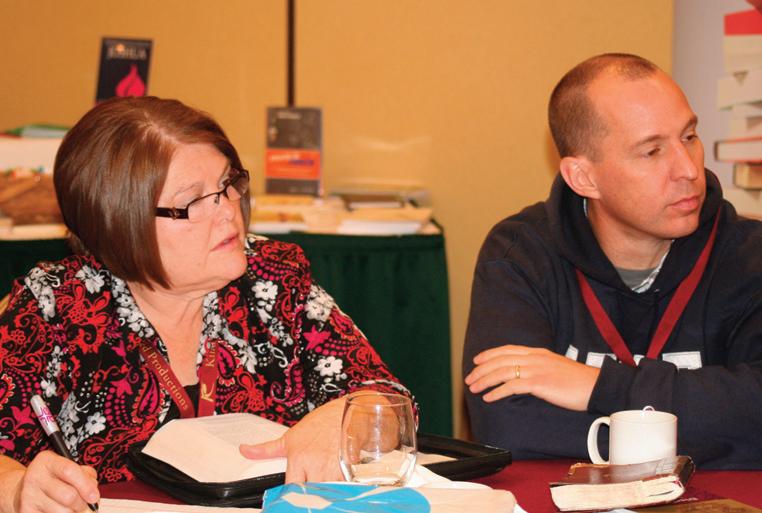
“The overwhelming feedback of those who participated was that this was a good idea and that the event was helpful,” says BFL in a March open letter. “The feedback also clearly indicated that the study conference was only a beginning. We must now discern together what it means to be a church family that confesses a commitment to peacemaking, but does not always agree on what that means.”
BFL has outlined their activities following the January 2013 study conference in two open letters posted
Mary Blough, Edmond, Okla., and James Bergen, Fresno, Calif., listen to conversation around their table during the January study conference.
online (www.usmb.org/kingdom-citizens-study-conference) and circulated to study conference participants, district BFLs and all USMB pastors.
The most recent letter, released June 25, reports that BFL representatives discussed with district BFLs and groups of professors at Fresno Pacific University, Fresno Pacific Biblical Seminary and Tabor College a preliminary draft of revisions to Article 13 and plans for revising and processing that draft.
The International Community of Mennonite Brethren also reviewed a draft of Article 13 and affirmed USMB for its efforts to address peacemaking. USMB Executive Director Ed Boschman says the feedback BFL received concerning this preliminary draft was positive and affirming.
“It was very helpful to hear various perspectives on the meaning of the words we use and to think about the proposed revision from the perspective of various geographies and cultures,” says Boschman. “We will process all responses at our fall meeting to develop what we anticipate will be the draft for approval presented at Conection 2014.”
Those interested in commenting on the most recent draft of Article 13 can view the draft and open letter at www.usmb.org/ proposed-article-13-for-discussion. Feedback can also be given to Nikkel at larrynikkel@tabor.edu or Boschman at ebed@usmb.org.
“I believe the outcome of this process will lead to a new degree of unity within our constituency and will provide a new platform from which we can energize a vision for peacemaking within our congregations and beyond,” says BFL Chair Nikkel.—by Connie Faber
Revised statement on peacemaking
The USMB Board of Faith and Life (BFL) is requesting feedback on the following revision to Article 13 of the Confession of Faith by Aug. 15. BFL will consider all comments at their September meeting, at which time they anticipate finalizing the recommended statement for delegates to consider at the July 2014 delegation convention in Santa Clara, Calif.
Love, Peacemaking and Reconciliation
God’s Community of Peace
We believe that God in Christ reconciles people to himself and to one another, making peace through the cross. The church is the fellowship of redeemed people living by love. The bond between followers of Jesus transcends all racial, social and national barriers.
Christian Peacemaking
We pursue peace and reconciliation in all relationships by following Christ’s example and his command to love God, neighbors and even enemies. We commit to being peacemakers and agents of reconciliation in families, churches, communities, in our nation and throughout the world. As peacemakers, it is our duty to alleviate suffering, reduce strife and promote justice, so that in an unjust and violent world, others may see in us a demonstration of Christ’s love. Because Jesus is Lord, his example and teaching take priority over nationalism and the demands of human authorities. Exodus 20:1-17; Matthew 5:17-28, 38-48; Romans 12:9-21; 13:8-10; 2 Corinthians 5:15-20; Ephesians 2:14-18; 1 Peter 2:19-23
Footnote: Historically, many Mennonite Brethren, as in other Peace Churches, have refused military participation and chosen alternative service.
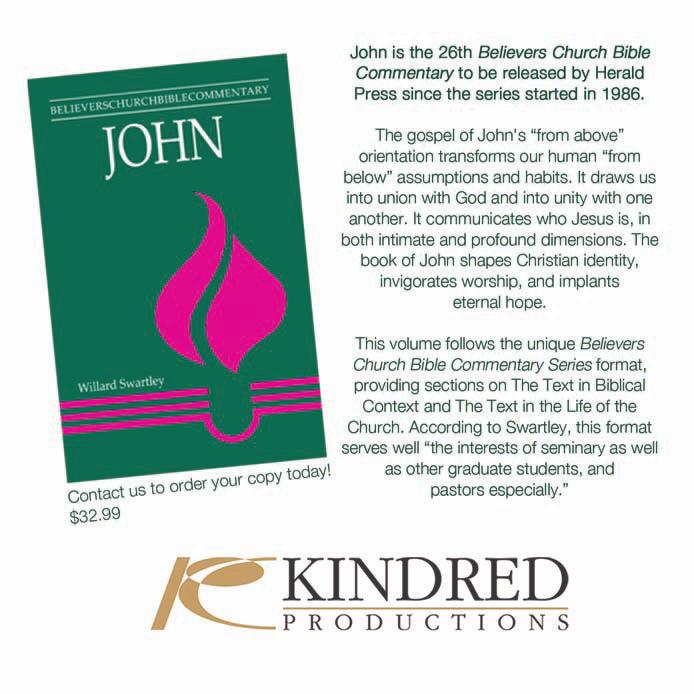
Beyond fine
North Fresno group provides “hope on steriods” for those facing illness
How are you? It’s a simple question that’s not so simple to answer for those facing life-changing illness. The easy answer is, “I’m fine.”
But it’s not always the honest answer, says Deb Friesen, co-founder of Assurance, an illness support group at North Fresno (Calif.) MB Church (NFC). Sometimes, retelling the story of one’s illness can be exhausting. Other times, an honest answer isn’t well received, especially if it includes doubt or anger. In these situations, “fine” is an acronym for “feelings I’m not expressing,” according to Friesen.
At Assurance, those battling illness, their families and caregivers find a safe place to share honestly and to receive support, prayer and a large dose of hope.
“The Assurance group is an extension of the church community that seeks to provide appropriate support when facing an illness,” says James Bergen, NFC pastor.
In the early 2000s, Friesen found her own life turned upside-down due to fibromyalgia and complications of back surgery. Unable to work as a nurse, she “hibernated” for seven years. Then God began nudging her toward something more, and she responded. “I prayed for God to somehow use me,” she says. “That was a very scary prayer.”
When Friesen’s dear friend Susan Harper was diagnosed with cancer, the pair dreamed of a group to help not only cancer patients, like Harper, but also those with chronic illnesses, like Friesen.
As Friesen began to research both secular and Christian options, she found little help. Resources for cancer patients and for those facing specific illnesses such as Parkinson’s or Alzheimer’s weren’t as inclusive as Friesen and Harper dreamed. Resources for grief support groups offered little help for those living daily with ongoing illness. So the pair sought the expertise of Delores Friesen, professor of pastoral counseling at MB Biblical Seminary, Fresno, Calif., now Fresno Pacific Biblical Seminary. They developed a model and started a pilot group at the seminary.
When that pilot group was successful, they approached their NFC pastor to ask if the group could be incorporated into the church’s ministry. With the support of Pastor Bergen and North Fresno leadership, the group began meeting at NFC in September 2009. NFC considers the group an official ministry of the church and part of the church’s broader caring ministry.
Friesen and Harper chose “Assurance” for the group’s name because that’s what faith provides in the midst of lifechanging illness. Not just hope, but something stronger, more certain, with no room for doubt: “Hope on steroids,” as Friesen says.
The group takes their cues from Hebrews 10:22-23, which talks about drawing near to God “with the full assurance that faith brings” and exhorts, “Let us hold unswervingly to the hope we profess, for he who promised is faithful.”
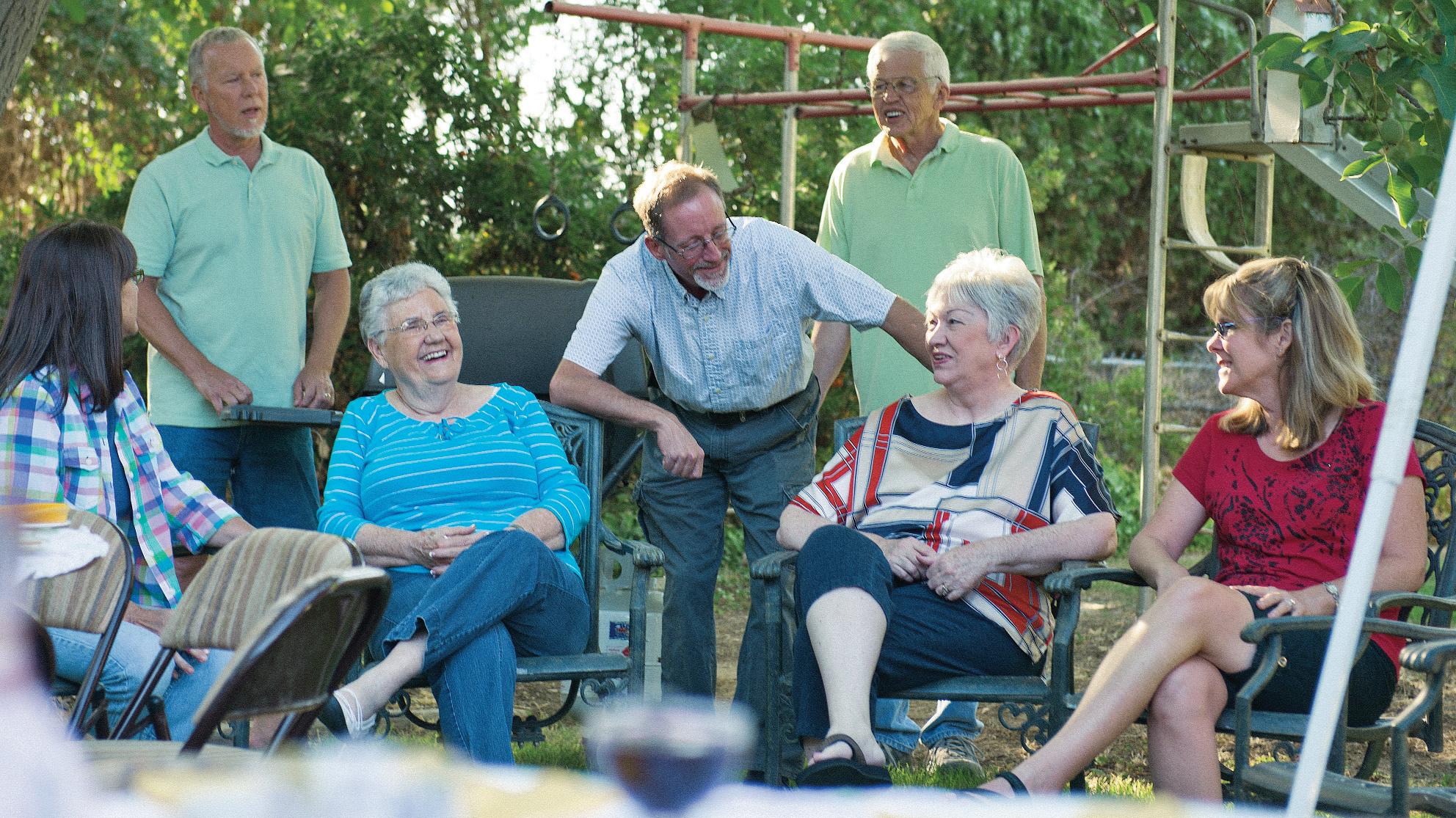
Deb and Dave Friesen, far left, appreciate the support they receive as members of Assurance, an illness support group at North Fresno MB Church. In the summer, members forego regular meetings for informal gatherings like this potluck in June.
Because faith in Christ is central to that hope, it’s fitting that Assurance is part of the ministry of a church. “Church is the perfect place to do it,” Friesen says. Without that shared dependence upon Christ, the group would be nothing more than an informational session, she says.
Bergen says that Assurance has brought transformation to the NFC congregation. “They have brought awareness to an important area of life and congregational ministry and are helping us be a community that better supports those with significant illness,” he says.
Assurance meets twice a month. The hour-long meetings are intentionally brief and punctual so as not to tax already-exhausted members. Meetings include sharing, a brief devotional or topic of discussion and prayer. While attendees may bring snacks, the time does not include formal refreshments, so that no extra energy is spent on organizing, serving and eating.
About 10 people are part of the group, although Friesen says it’s rare for all to be there, since illness often interrupts the best-laid plans. Caregivers and family members are welcome. Some members also offer helpful expertise or a different perspective, like a nurse who has experience in caring for those with long-term illness or Friesen’s husband, Dave, who is a licensed marriage and family therapist as well as a member with chronic health issues. While currently all the Assurance members come from North Fresno, the group is most certainly open to others.
By way of example, Bergen points to the hospitality and hope offered to one man from the community who joined the group in the last year of his life. “We were able to support him and journey with him until his death, and then host his funeral and support his family during that time,” Bergen says.
One of the marks of Assurance is freedom to share openly. A firm commitment to confidentiality means that what members share stays within the group. That gives freedom to be vulnerable, even to share doubts or anger at God, which are common feelings for those facing struggles.
In some ways, Assurance functions like a typical small group, with members encouraging, challenging and supporting one another. But it has become so much more. Perhaps because it’s a safe place to go beyond “fine” to complete honesty, Assurance members often connect on a deep level. The group has become a primary source of support for its members, even for concerns and circumstances that aren’t directly tied to the illness that brought them to the group. “This is who we turn to,” Friesen says.
In the time Assurance has been running, four participants have died due to cancer, including co-founder Susan Harper, who died in 2010. Bergen says Assurance “brought dignity to those facing and ultimately succumbing to death.”
One of those was Connie Freeland, who died in January 2011. About six or seven weeks prior to her death, she expressed in an email what the Assurance members meant to her: “All of a sudden I am weeping as I once more realize what this group of friends has done for me,” she wrote. “I had planned to give more details of my surprise early discharge, but somehow it now seems less important than my need to express my love and thanks. He is my Rock, but you are the little pebbles I can hold in my hand and say, ‘These are my friends; there are my little rocks holding me together.’ I love each of you.”
For more information about Assurance or starting a similar group, email Deb Friesen at ddfriesen@comcast.net or contact the North Fresno Church office at 559-431-0333.— Myra Holmes


Back to school
Watershed pastor, congregation involved in school reopening
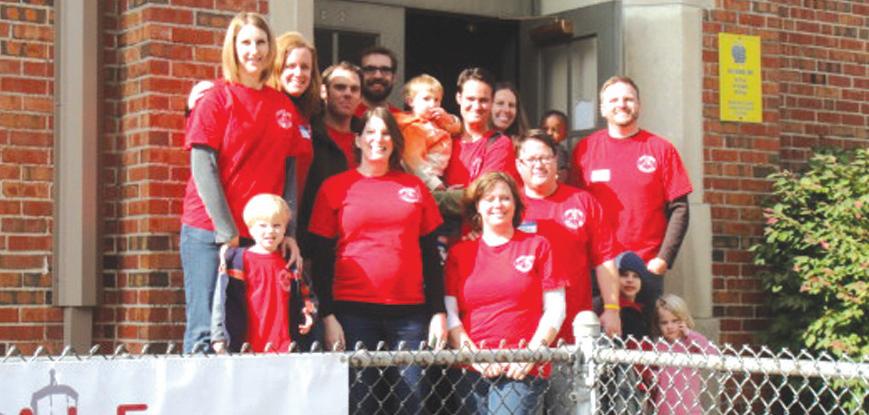
For the first time in a long time, two classes of students in Kansas City, Mo., will attend their neighborhood public school this fall. Teary-eyed mothers will let go of chubby hands. Butterflies will flutter in small stomachs as students settle into desks and open new boxes of crayons. And then a child will recognize a neighbor in the next desk, and a shy smile will calm the nerves just a bit.
For Paul Bartel, pastor of Watershed, a USMB congregation in Kansas City, this is what transformation looks like.
Watershed began in 2009 with a vision for what Bartel calls a “parish church model.” Church planters Paul and Amanda Bartel and Jason and Nancy Phelps moved into the Waldo/Brookside neighborhood, began to look for marginalized people and areas of brokenness and then looked for ways to serve. “We moved into a neighborhood and focused on loving and serving that neighborhood,” Bartel explains. Almost immediately, the public schools came to their attention as an area of need. The Kansas City Missouri School District (KCMSD) is troubled so deeply by abysmal academic performance, unresolved racial tensions and leadership instability that its failures have attracted national attention.
In March 2010, the district closed nearly half their existing schools due to declining enrollment and a dire budget deficit. By Jan. 1, 2012, the district had lost state accreditation and was given two years to demonstrate academic progress or face state takeover.
Those who can leave, do. The exodus has been dramatic as families have fled to private or charter schools, to other
districts or even to other states. KCMSD served up to 70,000 students at its peak; it now serves only about 17,000 students.
All this has very real ramifications for families left in the district and in the Waldo/Brookside neighborhood. Amanda Bartel said goodbye to a new friend when the friend’s child reached school age and the family moved to Kansas for better school options. Paul Bartel talks about volunteering with students reading at a first-grade level—in a third-grade class. And these struggling students comprise at least a third of the students in the class.
“It’s not impossible to succeed and to thrive in the district as it is,” says Bartel, “but it’s an uphill battle.”
So Watershed rolled up their sleeves and served. The nearest elementary school, Hale Cook Elementary School, closed just months after Watershed’s start. So the small church plant focused on the next nearest, Hartman Elementary, serving meals to staff, volunteering in classrooms and applying elbow grease to facility repairs.
In 2012, Watershed organized a book drive that far exceeded their expectations, gathering some 22,000 books and allowing them to give a book to every elementary school student in Kansas City public schools.
Then community members began to ask what should happen with the closed Hale Cook Elementary. Most answered that they’d like to see a neighborhood elementary school in that location—the kind of school to which children can walk and attend classes with their neighbors. The kind of school that becomes an informal hub for the com-
Paul Bartel, far right, joined Friends of Hale Cook as part of Watershed’s efforts to serve their community. Watershed is a USMB congregation in Kansas City, Mo.
Watershed
munity. So a grassroots effort to reopen Hale Cook began.
Bartel believed in the vision, so he joined Friends of Hale Cook (FOHC), the community group working to reopen Hale Cook. Bartel serves as vice-chair for the FOHC board of directors.
At first, the district told Hale Cook advocates that if they could clinch 350 new-to-thedistrict enrollees, the school would reopen. But an intensive enrollment campaign resulted in only 70 enrollees, far short of the goal. And the district superintendent they’d been working with resigned. It felt like they had returned to square one.
FOHC revised their proposal to include the possibility of renting facility space and to allow for organic growth. They poured energy into a feasibility study, door-to-door surveys, letters of support, a demographic study and a proposed budget and growth model. The new superintendent and the district liked the plan and agreed to reopen the school.
So when school begins in Kansas City this fall, two classes of Hale Cook students in kindergarten and first grade will be housed at Hartman Elementary. The district plans to renovate the Hale Cook building during the school year, then, assuming enrollment continues to grow, reopen it to serve students through second grade in fall 2014.
Although only Bartel serves officially with FOHC, Watershed has supported the efforts throughout the process. When FOHC hosts an open house or a picnic to connect with members of the community and spread the word, Watershed helps with food, supplies or volunteers. When FOHC organizes a workday or plants a community garden at the Hale Cook facility, Watershed folks pitch in.
But more importantly, Bartel believes that Watershed’s early and ongoing partnership with Hartman Elementary paved the way for a cooperative relationship with the district. He says that the school district had become a bit jaded by groups of volunteers who helped once, then disappeared. Watershed’s ongoing commitment built a different kind of relationship.
“I’m convinced that one of the reasons it has gone so smoothly is because Watershed set the stage by serving at Hartman,” says Bartel.
On one level, the success in this story is obvious: Hale Cook is slated to reopen. FOHC hopes the transformation in the community will be obvious as well: As families stay in the neighborhood rather than fleeing, the community will be more stable, and just maybe Hale Cook will begin to function as a community gathering place. Assorted community groups can meet there before and after school and hold events in the auditorium. Perhaps most importantly, Hale Cook’s success could inject hope and inspire new vision in those who have nearly given up on the community and the district.
“Our dream, our hope is that efforts like this will spring up all over the city,” Bartel says. “We don’t think that we in and of ourselves can do this, but maybe it would be the beginning spark of a transformation that would go throughout the entire district.”
That kind of transformation would be a victory for the kingdom of God as well. Bartel says: “Community transformation is kingdom transformation.”
Bartel says he’s felt a shift in his own thinking, from measuring spiritual change by attendance and baptisms to a recognition that God is at work in ways those numbers won’t show. “If we believe God is at work in our city, then our role is to partner in what God is doing,” he says. “Why would we not see the transformation of a school district as God’s work? We can proclaim that: See what God is doing!”
Watch a 15-minute, award-winning documentary about the effort to reopen Hale Cook by visiting http://youtu.be/a7xH3dlmsDY. —Myra Holmes







Don Morris Mission USA director
Following Jesus where he leads
As I’m writing this column I have a pounding headache. I don’t get these very often, and I feel for those who struggle with chronic headaches or migraines. But when I start thinking about poor little me and my headache, God seems to say, “Just think of the pain and suffering that so many will experience for eternity— those who are apart from me and don’t know me!”
That helps to put things in perspective. You see, I tend to have my own little rants and raves—some people might call them pity parties—about how difficult certain things are in my life. I can get fairly miserable when I think of the needed car repairs, a dental procedure I should have done or ministry circumstances that seem way too complicated. Why can’t life be easier? Why can’t I have it my way?
Then Jesus has to go and say, “Whoever wants to be my disciple must deny themselves and take up their cross daily and follow me” (Luke 9:23). So that means I probably shouldn’t whine about getting my own way and expect Jesus to pat me on the back and say, “There, there now.” I also likely can’t get by with simply uttering my typical selfish prayers of “give me this” or “give me that.” And the “take up their cross” part—that’s serious business.
Jesus was in all likelihood referring to the future cross of Calvary. His message was that of
The TOP THREE reasons why people don’tGO TO CHURCH:


pure surrender. The Roman cross, through its disgusting reality, demanded full submission to the point of death. The earliest disciples took Jesus’ saying literally, to deny themselves, to take up their own crosses of submission daily and to follow after Jesus where he leads.
Of course, the figurative sense is also true. When I fail to deny myself and seek Jesus’ will for my life, I am seeking to preserve my own future. The temptation to focus on other things is so strong at times. But surrender and trust are the way of the disciple.
So when I think about poor little me, Jesus is reminding me that to be a true disciple means cancelling the whining, taking up my cross of submission to him and following. It means that I concentrate more time and effort for the benefit of those who will be suffering—and not solely with a headache—for eternity. To be honest, I can’t even begin to imagine the daily suffering to be endured by those who don’t know Jesus. It makes me sad that I’m sitting here focusing on mundane pain. There are more important issues at hand.
Which reminds me—thoughts penetrating the fog of my headache—we have churches to plant. We have people to reach with the gospel. We have disciples to make. We have a cross to pick up.
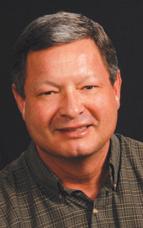



Source: Pete Brookshaw, http://www.peterbrookshaw.com/2012/08/10
Portland church planters to be commissioned in August
After a nearly one-year postponement, Trinity Church of Portland, Ore., is planning a special “sending” celebration August 18 for its daughter church plant, Christ Church Sellwood.
For the past year, church planter Jared Pulliam and his wife, Julia, have continued meeting with the new church’s core team. This team of 25 adults, plus children, have committed to joining the Pulliams in Portland’s unique Sellwood area in establishing this Mennonite Brethren church plant. Launch Sunday is planned for September 15.
“Sellwood is an area of Portland that is older but is a fairly affluent area with a lot of cultural flavor, and this attracts young professionals with families,” says Pulliam. “One of the reasons we selected Sellwood as the church plant location is because there are few churches in this community, and those that are present have been in decline. However, it is a very spiritual community of people, but they are looking in the wrong places to fill that spiritual need. We feel it is wide open for the gospel of truth.”
Mission USA Director Don Morris and Pacific District Conference (PDC) Minister Gary Wall join Pulliam, Trinity Church Pastor Art Azurdia and Trinity Church elders Norm Thiessen and Aaron Halverson in comprising the project team. The team will serve for the next three years. As the mother church, Trinity Church will provide additional oversight. Mission USA, the PDC and Trinity Church are subsidizing the church plant over the next three years.
“The delay in planting was no fun,” says Morris, “but all in all, I think the planting team is perhaps better prepared now than they were a year ago to go into this area of Portland with the message of the gospel and have a real impact.”
Wall says he is encouraged by the Sellwood project. “This is being done in such a healthy way,” he says. “Trinity Church has shown a tremendous amount of maturity and grace over the past year, especially for a church that is itself just three years old. They are intentionally focused on mission multiplication, which is another sign of a healthy mother church.”
Trinity Church continues to grow as well and is comprised of a wide range of ages, races and socioeconomic culture—a true cross-section of Portland’s cultural mix. Several new members were added recently.
“We will miss those who are leaving to plant the new church,” says Trinity pastor Azurdia. “But, this is about being kingdom-minded as a church. It’s what we decided to pursue at the very beginning of Trinity, to be a church that plants churches to reach people who have yet to embrace Jesus Christ,” he says.
Christ Church Sellwood will meet at the Sellwood Community Center located in the middle of the community. Quaint shops, coffee houses and mom-andpop businesses surround the center. It is an area that expresses many of the aspects of culture that make the Portland area unique.
“I saw a young lady of about 20 wearing a long, flowing skirt and riding down the middle of the street on a skateboard, and I thought, “Yes, that is Portland!”’ says Morris.
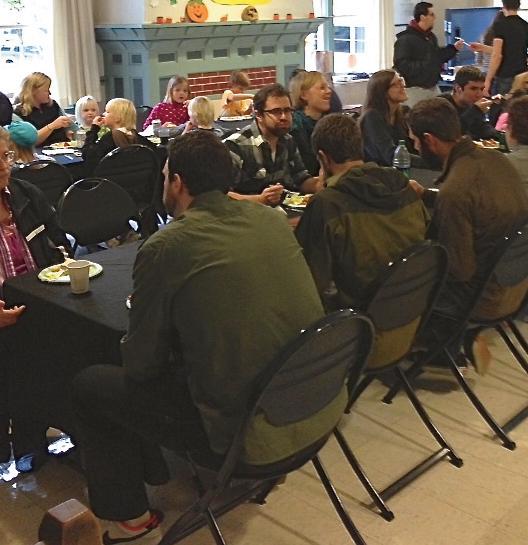
Don Morris
The Christ Church Sellwood core team enjoys a meal together.

Jon Wiebe
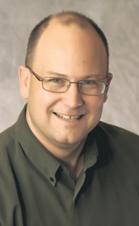
Charitable gift annuities let you sow and reap
Sowing generously and reaping generously is one of those core principles that farmers and disciples live by. A farmer sows generously in order to have the opportunity to reap a generous harvest. Likewise, a Christian must sow generously in order to abound in every good work and enlarge the harvest of righteousness (2 Cor. 9:6,10).
However, many folks find themselves in an awkward and disappointing predicament as they grow older and rely more on a fixed income stream. As a result, they often find it necessary to give less to charity. After increasing giving when their income hits its peak, they are frustrated by having to reduce their giving as income levels off or declines, their medical needs increase and their resources start to become depleted. The result is often less money available to sow generously into the ministries they have loved supporting throughout their life.
A charitable gift annuity (CGA) is a giving tool that allows someone in this situation to continue to sow and reap generously. The concept is relatively simple: You donate assets or cash now to charity, they pay you an income stream on that donation and the charity gets to keep the remainder of the gift after you die. The more you contribute, the greater your payout, and the greater the benefit to charity at your death. Sowing generously enlarges the harvest of your righteousness and funds good works!
A CGA is a tool that best fits retired folks who want to boost their income while securing a gift or younger folks who are interested in deferring the income stream till a later date. Either way, it is a great way to leave a legacy gift to fuel ministry. Another incentive is that the donor receives a higher income stream than is currently available from a bank certificate of deposit or a savings account.
What does the charity get out of the arrangement? An irrevocable cash gift sometime in the future. If, however, the money you donated runs out before you die, then the charity is still obligated to payout your income, using its own funds as necessary. So it is important to have your CGA issued by a charity that is financially sound.
MB Foundation offers charitable gift annuities and currently manages 162 contracts worth $5.6 million. MB Foundation serves these annuitants by providing expert administration of the gift and a sound financial footing and acts as a conduit to facilitate the gift to one or more ministries of the donor’s choosing.
Establishing a CGA with MB Foundation is simple and does not require legal counsel. Generally, the charitable gift annuity works best for donations in the $15,000 to $100,000 range. Larger donations might be better served through a charitable remainder trust that offers more flexibility and other benefits.
If a 77-year-old donated $25,000 to MB Foundation via a CGA, the annuity or payout rate would be 6.2 percent paid quarterly, with an immediate charitable tax deduction of $10,745. The annual annuity amount would be $1,550, of which $1,285 is tax-free and $265 is ordinary income. Rates are established by the American Council of Gift Annuities and are based on life expectancy. So the older you are, the higher rate you get.
The benefits of a charitable gift annuity are many—security, increased income, tax deduction, etc.—but the true benefit is intangible: the opportunity to secure a gift to the ministries you love while you’re still alive.
To determine your own payout rate and tax benefits, visit MBFoundation.com/cga.
Jon Wiebe is president and CEO of MB Foundation, the USMB stewardship ministry.
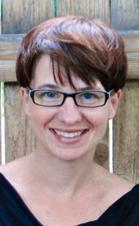
Anne Griffin
How a unique social networking site builds community
My title is Worship Pastor, but my role is like many in ministry—it includes a plethora of tasks that don’t quite fit the title. When I was hired at Trailhead Church, I agreed to manage the “administrative” aspects of our church. Administration is one of my gifts, and it seemed like this would be a minor portion of my week. I would be a worship pastor who did a few administrative tasks on the side.
Then, the emails started rolling in—prayer requests, birth announcements, meal needs and job postings. I would receive an email and then forward it to the entire church. This required keeping all email addresses current in my contact list. It also meant keeping our Excel directory, event planning website and giving software up to date. I was entering each person’s contact information into four different places, which was challenging in a quickly growing community. I began to feel less like a worship pastor and more like an administrator.
I knew that in the year 2009 there had to be a program that allowed us to be in contact as a church, plan events and even track our finances—all in one place. I searched the Internet high and low until I found “The City.” This site was in its beginning stages but seemed to have everything I was looking for.
The City describes itself this way: “The City helps everyone in your church stay engaged in daily life and ministry. It’s a group-oriented social network that’s all about helping your church build deeper community and extend the love of Christ to the world.” Sounds great, right? It turned out to be more helpful than I imagined.
The City is similar to social networking platforms in that each person has a personal profile. But rather than being primarily social, The City allows everyone to share

and be a part of what is going on in his or her worship community. It took a bit of time, but The City is now an integral part of our communication at Trailhead.
People can log on to post prayer requests, needs, events and even thoughts they are having about spirituality. Small groups have their own groups on The City where they privately share. Other groups like children’s ministry workers use The City to do scheduling or find substitute teachers. The City is private; however we have the option of making posts public on “The Plaza.” To check it out, visit www.trailhead.onthecity.org/plaza. This is great for visitors or for inviting friends outside of Trailhead. We also have a direct link to The Plaza on our church website.
Some of the greatest benefits for Trailhead include updating people instantly. If someone needs prayer, they can log on and post it so that it is seen immediately. It also allows people to dialogue about topics such as community and service. More recently, we have been posting the text and theme for the upcoming Sunday so that people can read it ahead of time and come more prepared for the sermon.
All of this has alleviated so much of my workload and has allowed the entire community to take more ownership in our communication. I can focus more on other aspects of my role as worship pastor while our community is able to communicate and care for each other in a simple, effective way.
For more information on implementing The City at your church, visit www.onthecity.org.
Anne Griffin is the worship pastor at Trailhead Church, a USMB congregation in Centennial, Colo.




Everence, a stewardship ministry of Mennonite Church USA that also serves USMB, is holding a video contest open to anyone between age 15 and 25. The theme is “Money talks: What are you hearing?” The top prize is $2,000 split between the winner and the winner’s selected charity. Second place is $1,000 split between entrant and charity, and third prize is $500 split between entrant and charity. Submission and entry information is at the everence.com/moneytalks website. Videos can be entered between Oct. 1 and Nov. 15 and online voting will open Dec. 16 and close Jan. 13, 2014.
re: Video contest






churchNotes
BAPTISM/MEMBERSHIP
Four teens from Bible Fellowship Church, Rapid City, SD, were baptized during a short-term service trip in June.
Jennifer Yoder was baptized June 23 at Henderson (Neb.) MB Church. Carol Myers and Jason Quiring were also received as members.
Kaci Adams, Roger Douglass, Ashlie Ellingford, Don Hathaway and Vanessa Ricord were baptized June 9 at The Springs@SMCC, St. George, Utah
Robert and Candice Fowler, Sonya Halsey and Dande and Susan Matusalem were baptized and received as members of Dinuba (Calif.) MB Church May 19. Michael and Jessika Loucks, Charles and Vickie Smith and Alice Wiens were also received as members.
Jessica Birch and Morgan Papac were baptized June 16 at Laurelglen Bible Church, Bakersfield, Calif. Lee and Marvis Meyer and Michael and Morgan Papac were received as members. David and Laura Leppke, Mary Lemme and Ann Paslay were received as members June 9. Jennifer DeSouge, Emily Giese, Jen Stewart, Ryan and Nicole Rice and Noah, Macy and Halle Rice were baptized May 12.
Seth Brown, Ariana Martinez, Matthew Lotts, Priscilla and Adam Bocanegra, Justin Carter, Rebecca Horst, Michael Carroll and Jason Sanders were baptized in June at Heritage Bible Church, Bakersfield, Calif. Matt, Jessica, and MJ Bohman, Michael Long and Rachel Hicks were also received as members.
Tommie Brown, Rachelle Orender, Emily Thomas, Mark Toon, Melissa Toon and Kelly Zens were baptized June 8 at The Bridge Bible Church, Bakersfield, Calif.
Bill and Diana Branch, Peter and Sabrina Caines, Norvella Elston, Justin and Pam Greenleaf and Werner Wallace were received June 16 as members of North Oak Community Church, Hays, Kan.
Patricia Cary, Amanda Conner, Ryan Kelley and Tim Reynolds were baptized May 26 at First MB Church, Wichita, Kan. Ryan and Annie Boucher, Lyndon Entz, Travis Jost, Kendra Kinkaid, Lauren Ransom, Kendra Reynolds, Peter Rusack, Diane Smith and Dale and Stan Weir were received as members.
Morgan Hiebert and Kaylie Laverty were baptized and received as members of Memorial Road MB Church, Edmond, Okla., May 19. Deneke Belay, Danny and Kathy Gossen, Ed and Shirley Medcalf, Jeff and Abby Mishler, Toby and
Emma Smith, Robert and Amber Tucker, and Caleb and Becky Wahlgren were also received as members.
Florence Oxford, Brooke Boydstun, Katie Friesen, Katryn Kroeker, Douglas Regier, Tyler Rich and Riley, Jordan and Adrian Betz were baptized and received as members of Enid (Okla.) MB Church May 5. Charles and Amy Reed and Tyron and Sarah Wheeler were also received as members.
Nancy Prout was baptized June 9 and received as a member of Belleview Community Church, Littleton, Colo.
Hayley Mozingo and Sarah Sperling were baptized May 5 and received as members of Shafter (Calif.) MB Church. Susan Arnold was received as a member.
Claire Schellenberg was baptized May 19 and received as a member of College Community Church MB, Clovis, Calif.
Dustin and Melissa Enns, Kimberlee Jost, Callie Meisinger, Shelly Padgett, Darian Ratzlaff, AlexAnna Ratzlaff and Scott and Shana Thornhill were baptized May 19 and received as members of Ebenfeld MB Church, Hillsboro, Kan. Bruce Jost was also received as a member.
Brent Bauer, Chelsea Bauer, Nickolas Sullivan, Saskia Penzhorn, Mary Birt, Cathy Morgan, Christian Main, Heather Timmins, Kolten Willnow and Kayden Willnow were baptized May 5 at South Mountain Community Church, Draper, Utah.
CELEBRATIONS
Birch Bay Bible Community Church, Blaine, Wash., celebrated their 75th anniversary July 57. Activities included an anniversary choir, noodle soup supper and celebration banquet and program.
WORKERS
Trevor Lee began serving July 15 as pastor at Trailhead Church, Centennial, Colo.
Vince Carrig has resigned as pastor at New Life Fellowship, Grant, Neb.
Ray O’Neil has retired from the pastoral staff of Reedley (Calif.) MB Church. His last Sunday was June 30. Eric Young has resigned as youth pastor, effective June 30.
Coalt Robinson was installed June 30 as lead pastor of Bethel MB Church, Yale, SD Matt Bohman began serving in June as the new children’s director at Heritage Bible Church, Bakersfield, Calif.

Phoenix church closes
The Bridge on Glendale, a Mennonite Brethren congregation in Phoenix, Ariz., with a 50-year history of ministry, has closed. Changing community demographics, decreasing attendance and ongoing financial difficulties contributed to the decision to close. The final service was held May 12. Gary Wall, Pacific District Conference (PDC) district minister, says, “It was a church where Jesus was present and the Word proclaimed, and the life of the community was real and dynamic.” The congregation began as Palm Glen Neighborhood MB Church in March 1963 under the auspices of the PDC Board of Home Missions. Over the years the congregation underwent a number of transitions, reflected in several name changes: Desert Valley Community Church, Spirit in the Desert and, finally, The Bridge on Glendale. Former pastors include Wes Gunther, Jacob Froese, Alan Whaley, Ed Toews and Ron Friesen. In 2006, the PDC Board of Home Missions initiated a replant of the church under the current name. Tracy Estes was the lead pastor of that effort, followed by Preston Dobbins, who has led the congregation for the last five-plus years. Dobbins and his wife, Francisca, “served well, shepherding this relatively small fellowship with love and grace,” says a PDC announcement of the closure.

Mountain View hosts community prayer event
Mountain View Community Church, Clovis, Calif., opened their facility to the community for Global Day of Prayer May 10-19. More than 300 people took advantage of 10 creative stations with such themes as an outpouring of the Holy Spirit, persecuted Christians and laborers in God’s harvest that lined the walls of the sanctuary to pray for the world. On Pentecost Sunday, May 19, the congregation joined with five other local churches as well as Christians around the world culminating the 10 days of prayer in an evening service centered on “A Prayer for the World.” Mountain View has participated in Global Day of Prayer since 2005.
CCCMB breaks ground
College Community Church Mennonite Brethren (CCCMB), Clovis, Calif., broke ground on a campus expansion and remodel May 26 as part of their 50th anniversary celebration. CCCMB was established in 1963 and has been worshiping at its current location since 1965. Over the years the church has shared its facilities with various community organizations; it is presently the meeting place for an active Clovis Community Watch group and a Fresno County EOC Head Start preschool. Building plans include a new 300-plus-seat sanctuary, infant nursery, memorial garden and administrative wing. Existing facilities will be reconfigured as flexible spaces for educational and social functions.
Melissa Bloemhof and Simon Viss served as summer interns at Shafter (Calif.) MB Church.
Megan Miller served as a summer intern at Enid (Okla.) MB Church
Kevin Larson has been called as the new youth pastor at Garden Valley Church, Garden City, Kan.
First MB Church, Wichita, Kan., recently hired three new staff members: James Burkett, pastor of adult ministries; Lori Gallagher, director of kids ministries; and Matt Ehresman, media director. In addition, Kaitlyn Brown, Kruze Sanders, Rebecca Spahr and Stacey Warkentin are serving as summer interns.
Rachel Smith is a summer intern at Dinuba (Calif.) MB Church, serving with children and youth.
Garden Park Church, Denver, Colo., called Justin Hiebert as lead pastor. Hiebert had been serving in an interim role.
Rod Anderson resigned as pastor of Christ Community Church, Sioux Falls, SD, at the end of May.
DEATHS
Dalke, Jerry L., Hillsboro, Kan., of Hillsboro MB Church, Oct. 28, 1945—May 20, 2013. Parents: William and Opal (Longhofer) Dalke. Spouse: Violet (Funk) Klassen. Children: Anita Unruh, Amy Ratzlaff, seven grandchildren.
Fast, Leslie, Littleton, Colo., of Belleview Community Church, Littleton, Oct. 8, 1927—May 20, 2013. Spouse: Vi. Children: Bruce, Doug, Daryl, Greg, Kevin.
Hartling, Michael J., Enid, Okla., member of Enid MB Church, Nov. 22, 1948—April 8, 2013. Parents: Harold and Marjorie (Livingston) Hartling. Spouse: Norma Buller. Children: Michael, Kim; three grandchildren.
Nikkel, Arlene, Bakersfield, Calif., of Rosedale Bible Church, Bakersfield, Oct. 14, 1933—May 12, 2013. Parents: Aaron and Flora Kliewer. Spouse: Norman. Children: Cary, Connie Thiesen, Colleen Kiger; eight grandchildren.
Overholt, Mendal, Bakersfield, Calif., of Rosedale Bible Church, Bakersfield, Aug. 4, 1919—June 12, 2013. Parents: George and Laura Overholt. Spouse: Helen. Children: Lillian Carlson, Allen, James; numerous grandchildren.
Schmidt, A.B.P., Corn, Okla., member of Bible MB Church, Cordell, Okla., Oct. 2, 1933—May 1, 2013. Parents: A.R. and Freda (Krewall) Schmidt. Spouse: Bernice Reimer. Children: Buddy, Chris Loewen, Eileen Thompson, Gretchen Reimer; 10 grandchildren; five great-grandchildren.
Voth, Jacob A., Enid, Okla., member of Enid MB Church, Jan. 23, 1928—April 27, 2013. Parents: Jacob A. Sr. and Elizabeth (Schmidt) Voth. Spouse: Beverly Hamm. Children: Steven, Pamela Schoenhals; four grandchildren; one great-grandchild.
reaching
DESCIPLESHIP
in
Community Bible Church, Olathe, Kan., distributed wristbands to remind attendees to pray for youth attending camp this summer.
Ebenfeld MB Church, Hillsboro, Kan., reports that eight children made decisions for Christ at vacation Bible school June 10-14.
Youth at Salem MB Church, Freeman, SD, memorized Bible verses to earn scholarships for summer camp.
FELLOWSHIP
Attendees at Rosedale Bible Church, Bakersfield, Calif., enjoyed an all-ages church softball game on the church’s softball diamond. Twentyone men spent Father’s Day weekend on a retreat at Sugarloaf.
Shafter (Calif.) MB Church hosted their annual wrestling camp July 22-26.
Bible Fellowship Church, Rapid City, SD, held a treasure hunt for children age three through sixth grade. The June 26 event also included prizes for the winning team, ice cream, snow cones and a puppet show.
Pine Acres Church, Weatherford, Okla., offered several storytimes for children kindergartenaged and younger this summer. Children heard a story, ate a snack and made a craft related to the story while parents visited.
A spring women’s event, “Praising Him Through the Puddles,” held April 14 at Dinuba (Calif.) MB Church focused on the power of intercessory prayer.
Christian comedian Ken Davis gave a concert June 15 at First MB Church, Wichita, Kan High school youth at Zoar MB Church, Inman, Kan., hosted a breakfast for the congregation May 19. Proceeds helped fund a mission trip to Colorado this summer.
WORSHIP
April 28 was Creation Care Sunday at North Fresno (Calif.) Church. In addition to teaching on the topic and practical application ideas, representatives from various creation care organizations were featured during the morning.
Former pastor Earnest Weber spoke May 19 at Martin Box Church, Marshall, Ark.
reaching out
LOCALLY
First MB Church, Wichita, Kan., partnered with Lighthouse Community Church, Wichita, for a July 7 BBQ in the Lighthouse neighborhood.
Volunteers from Good News Fellowship, Ferndale, Wash., painted, picked up litter and cut brush as part of a service Sunday, June 30. A picnic lunch at the park followed.
Dinuba (Calif.) MB Church partnered with another local congregation for an outreach in the park April 28, including worship bands, bounce houses, hotdogs, prizes, testimonies and an offer to pray for people.
The Harlow Neighborhood Association recently won an award for Feed Hope, an initiative organized by North Park Community Church, Eugene, Ore., and other community partners on behalf of the neighborhood association that aims to feed underprivileged school children. This effort was featured in the February/March CL.
GLOBALLY
A team from Shadow Lake Community Church, Papillion, Neb., served in Jamaica June 29-July 6.
Five people from Bethesda MB Church, Huron, SD, served short-term in the inner city of Chicago this summer.
Bethany MB Church, Fresno, Calif., sent a team of 18 to serve in the Dominican Republic June 30-July 14.
A team of five from Hillsboro (Kan.) MB Church traveled to France June 20-30 to work beside, pray for and encourage workers with MB Mission there. A group of high school students spent the first week of July in Anadarko, Okla., leading a vacation Bible school, doing home repair work and volunteering in the community.
A team from Kingsburg (Calif.) MB Church served in Thailand July 8-22.
Laurelglen Bible Church, Bakersfield, Calif., sent teams to Uganda and India this summer. They sent individuals or families to East Asia, India, Nicaragua, British Columbia, Romania, Ghana and the Navajo Nation.
A team from Garden Valley Church, Garden City, Kan., served in Mexico July 13-20.
Twelve high school students and two adults from Enid (Okla.) MB Church served in Nicaragua this summer.
A team from Bible Fellowship Church, Rapid City, SD, served in Nicaragua July 22-30.
A team of 10 people from North Fresno (Calif.) Church served in Portugal July 15-29.
CLEARINGHOUSE
Worship Minister: Shorelife Community Church, a small MB church in Capitola, Calif., is searching for a person to lead our community of believers in worship during weekly worship gatherings. This is a paid, part-time position. A complete job description is available upon request. To apply send a resume and a DVD/CD or Youtube link to: Shorelife Community Church, 875 Monterey Avenue, Capitola, CA, 95010 or email at: daniel@shorelifecc.org
Lead Pastor: Henderson (Neb) MB Church is a congregation of 107 members in a rural community looking for a pastor with leadership skills; strong values of prayer, personal integrity and professional growth; who relates well with young adults and families; has a relevant preaching style and heart for evangelism. For further information: email mbchurch@mainstaycomm.net or visit our website hendersonmbchurch.com
Visitation Pastor: Parkview Church in Hillsboro, Kan., is seeking a quarter-time visitation pastor for the elderly. Inquiries or resumes should be sent to: Parkview Church, 610 S. Main Street, Hillsboro KS 67063 or emailed to: steve@parkviewmb.com.
Lead Pastor: Bethany MB Church in Fresno, Calif., is seeking a qualified individual to serve as a lead pastor to a multigenerational congregation of approximately 225 in northeast Fresno. Seminary graduation is required. Previous pastoral experience is preferred. Please send resumes to Jay Wiebe, Bethany MB Church, 9161 N. Maple, Fresno CA 93720 or to jawiebe5@msn.com.
Pastor of Care Ministries: The Shafter (Calif.) MB Church is seeking a part-time pastor of care ministries. For additional information please contact Pat Coyle, Senior Pastor (pcoyle@shaftermb.org).
Senior Pastor: Grace Bible Church, Gettysburg, SD, is searching for a full-time pastor with leadership qualities, who can relate well with young married/single adults. Our evangelical church is very social and outgoing with approximately 110 members. Send resumes and inquiries to Ray VanBockel c/o Grace Bible Church, 310 South Broadway, Gettysburg, SD 57442.
Lead Pastor: Waterloo (Ont.) MB Church is a church in mission: a people sent by God to live incarnationally for Jesus in every area of our lives and a church called to be an integral component of our broader community. We are looking for a Lead Pastor who is a strategic and forward thinker, a developer and multiplier of leaders, and an effective communicator. To learn more about Waterloo MB Church and this opportunity, visit www.waterloomb.org/employment
MEDA Convention: “Cultivating Solutions: Harvesting Hope.” Join MEDA for four days of inspiration, information and networking in Wichita, Kan., November 7-10, 2013. Go to www.medaconvention.org for full descriptions of the plenary sessions, seminars, tours and on-line registration or call 1 (800) 665-7026 for more information. Per-event rates available. No charge for the Year-in-Review or Sunday morning plenary.
































